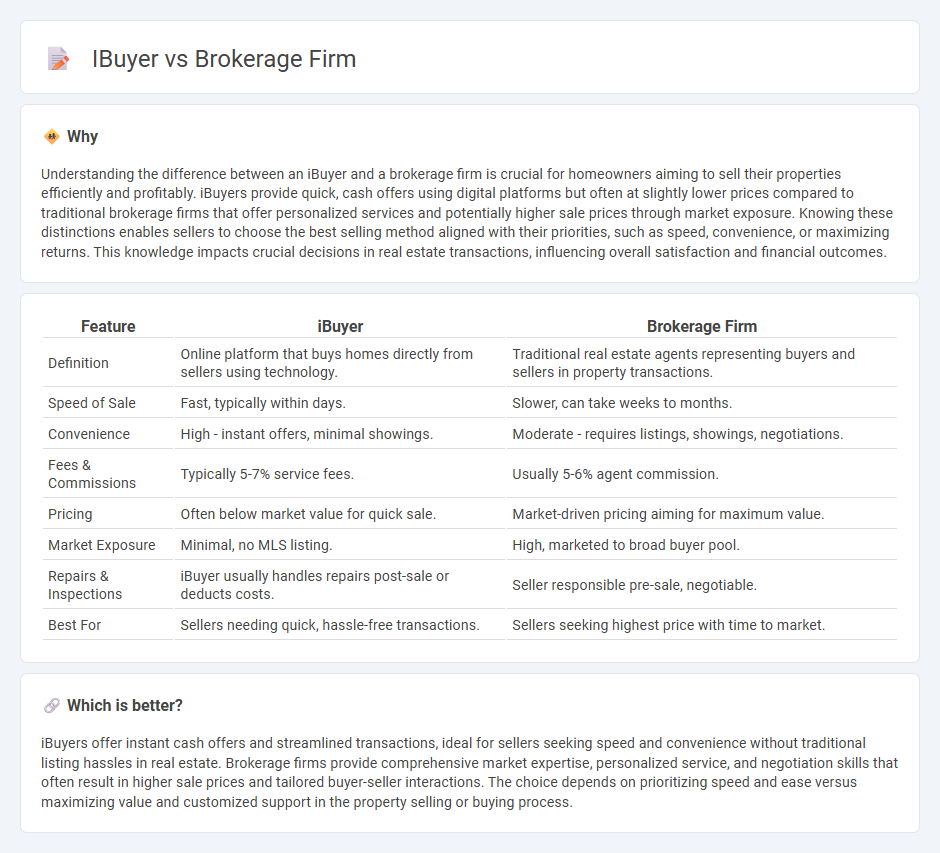
iBuyers use technology-driven platforms to provide instant offers on homes, streamlining sales with quick closings and reduced contingencies. Brokerage firms rely on licensed agents for personalized marketing, negotiation expertise, and comprehensive market knowledge to maximize property value. Explore the differences between iBuyers and traditional brokerage firms to determine the best approach for your real estate needs.
Why it is important
Understanding the difference between an iBuyer and a brokerage firm is crucial for homeowners aiming to sell their properties efficiently and profitably. iBuyers provide quick, cash offers using digital platforms but often at slightly lower prices compared to traditional brokerage firms that offer personalized services and potentially higher sale prices through market exposure. Knowing these distinctions enables sellers to choose the best selling method aligned with their priorities, such as speed, convenience, or maximizing returns. This knowledge impacts crucial decisions in real estate transactions, influencing overall satisfaction and financial outcomes.
Comparison Table
| Feature | iBuyer | Brokerage Firm |
|---|---|---|
| Definition | Online platform that buys homes directly from sellers using technology. | Traditional real estate agents representing buyers and sellers in property transactions. |
| Speed of Sale | Fast, typically within days. | Slower, can take weeks to months. |
| Convenience | High - instant offers, minimal showings. | Moderate - requires listings, showings, negotiations. |
| Fees & Commissions | Typically 5-7% service fees. | Usually 5-6% agent commission. |
| Pricing | Often below market value for quick sale. | Market-driven pricing aiming for maximum value. |
| Market Exposure | Minimal, no MLS listing. | High, marketed to broad buyer pool. |
| Repairs & Inspections | iBuyer usually handles repairs post-sale or deducts costs. | Seller responsible pre-sale, negotiable. |
| Best For | Sellers needing quick, hassle-free transactions. | Sellers seeking highest price with time to market. |
Which is better?
iBuyers offer instant cash offers and streamlined transactions, ideal for sellers seeking speed and convenience without traditional listing hassles in real estate. Brokerage firms provide comprehensive market expertise, personalized service, and negotiation skills that often result in higher sale prices and tailored buyer-seller interactions. The choice depends on prioritizing speed and ease versus maximizing value and customized support in the property selling or buying process.
Connection
iBuyers and brokerage firms collaborate by integrating technology-driven instant home sales with traditional real estate services, enhancing market liquidity and client options. Brokerage firms often partner with iBuyers to provide homeowners quick sale alternatives while maintaining personalized support and negotiation expertise. This synergy optimizes transaction speed, pricing accuracy, and customer satisfaction within the real estate ecosystem.
Key Terms
Commission Structure
Brokerage firms typically charge a commission ranging from 5% to 6% of the final sale price, which covers marketing, negotiations, and transaction management. iBuyers offer a streamlined process with flat fees or service charges often between 1% and 3%, eliminating traditional agent commissions but sometimes resulting in lower sale prices. Explore the nuances of commission structures to determine which option best suits your real estate goals.
Instant Offer
Brokerage firms rely on traditional home selling processes involving listing, staging, and negotiations, often taking weeks to months for a sale. iBuyers provide Instant Offers by using proprietary algorithms to quickly assess property value and purchase homes directly, enabling faster transactions without showings or open houses. Discover how Instant Offer technology by iBuyers is revolutionizing the real estate market.
Agent Representation
Brokerage firms provide personalized agent representation, offering tailored market insights, negotiation expertise, and comprehensive support throughout the buying or selling process. In contrast, iBuyers streamline transactions by making instant cash offers online, often eliminating direct agent involvement and reducing personalized guidance. Explore the advantages and limitations of each model to determine the best fit for your real estate needs.
Source and External Links
Brokerage Firm Definition & Services - Lesson - Study.com - A brokerage firm is a financial institution that acts as a market intermediary connecting buyers and sellers, offering services like buying and selling securities, with types including full-service, discount, and online firms.
What is a brokerage firm? - Fidelity Investments - Brokerage firms allow investors to trade various assets such as stocks and bonds, providing platforms for execution and often charging commissions or fees; they come as full-service, discount, or online brokerage firms, each catering to different investor needs.
Brokerage account - Charles Schwab - A brokerage account is an agreement with a licensed brokerage firm where investors deposit funds and place orders to buy or sell financial products like stocks, ETFs, and bonds, often with low or zero commissions and access to trading tools and support.
 dowidth.com
dowidth.com